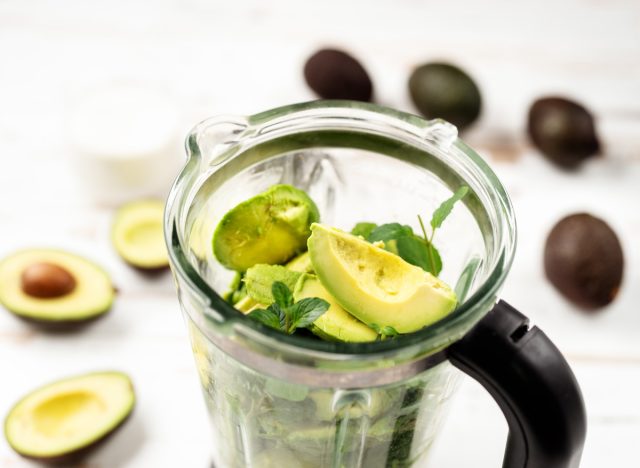4 Best Drinking Habits To Reduce Inflammation and Slow Aging

The foods and drinks that we consume on a regular basis play an enormous role in our health, especially as we age. And while there is no way to "stop" the aging process, we can include things in our diet that can help us age in the healthiest way possible.
One of the many common issues that can contribute to speeding up the aging process is chronic inflammation. There are many factors that can contribute to inflammation, like excessive alcohol, a diet high in processed foods, and smoking.
To learn more about this, we talked with a few dietitians about drinking habits that can help reduce inflammation and slow the aging process. Read on, and for more healthy aging tips check out 5 Anti-Inflammatory Breakfasts to Slow Aging.
Stay hydrated.

"Staying hydrated is the most important drinking habit that reduces inflammation," says Dana Ellis Hunnes PhD, MPH, RD the author of Recipe for Survival. "When we are dehydrated it adds extra stress on the body, and stress increases inflammation and ages us at the cellular level."
And along with reducing inflammation and stress in the body, being hydrated is necessary for living a longer life, as well. According to an article published in Nutrition Reviews, dehydration, as well as lack of electrolytes, is associated with greater mortality and disease.
Drink black coffee.

"Coffee is known to be an anti-inflammatory beverage because it contains polyphenols and antioxidants that neutralize free radicals and reduce stress and inflammation in the body," says Hunnes.
However, it's important to note that most research refers to the health benefits of black coffee, meaning coffee that isn't loaded with cream and sugar. If you're not a black coffee drinker though, maybe try creamers and sweeteners with less added sugar because studies have found that sugary beverages may contribute to more inflammation.
For example, one study published in Nutrition Reviews found that larger amounts of added sugar in coffee, tea, and other beverages were associated with higher levels of inflammatory markers in the body.
Regularly drink herbal tea.

"Most herbal hot teas have serious health benefits based on their phytonutrient contents, and many of these are anti-inflammatory and help reduce toxins in the body," says Trista Best, MPH, RD, LD at Balance One Supplements. "If these toxins and inflammation are to persist they will result in an increase in aging, among other negative side effects."
Many of these teas have their own unique combinations of nutrients. For example, "hibiscus tea, in particular, is a powerhouse of vitamin C," says Best. One study published in Drug Design, Development and Therapy found that vitamin C can have the ability to reduce inflammation in patients with diabetes or high blood sugar.
Add avocado to your smoothie.

If you're a fan of drinking a smoothie in the morning or for an afternoon pick-me-up, you may want to start adding avocado to your beverage. Not only will avocados give your smoothie a boost of creaminess, but they are packed full of nutrients that can help reduce inflammation and slow aging.
"Avocados are high in the 'good for you' type of fat (monounsaturated fats) which have been shown to reduce inflammatory markers in the blood," says Rachel Fine, RDN and founder of To The Pointe Nutrition. "They are also rich in antioxidant polyphenols, which are believed to offer cardiovascular benefits like reducing cholesterol levels, as well as vitamin E, which can help those struggling with dry skin by forming a moisturizing layer on the skin's surface. And last, avocados contain a small amount of the carotenoid lutein, which might support reductions in age-related macular degeneration."









